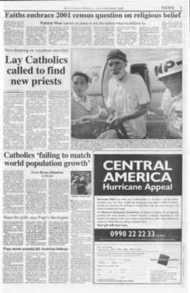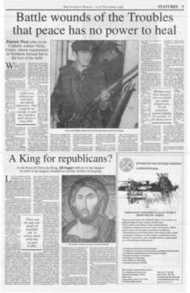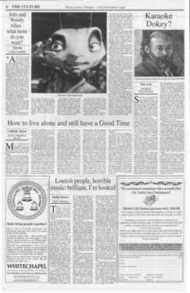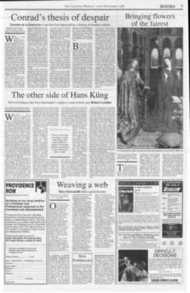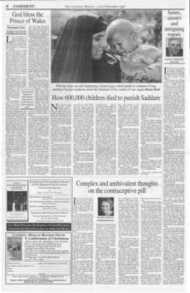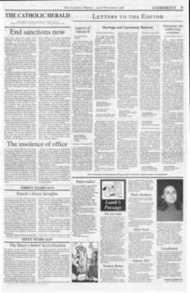Page 8, 20th November 1998
Page 8

Report an error
Noticed an error on this page?If you've noticed an error in this article please click here to report it.
Tags
Share
Related articles
The Loyalty Of A Secret Wife
Charting The Life Of The Queen Who Never Was
Virginity Is Old Hat, But Fish Forks Are Still U...
African Diary
Resurrection: An Historian Convinced By The Evidence
God bless the
Prince of Wales
Personal View JAMES MUNSON
LAST SATURDAY I raised my glass in a toast to the Prince of Wales. Like many loyal subjects I thought about this man about whom we know so much — too much in my opinion.
As Catholics we are taught that the unworthiness of the priest does not affect the validity of the Sacrament he administers. Priests do not have to display certificates of worthiness before they approach the altar. Yet when it comes to a man who will in time inherit an office that atone in the British constitution has a sacerdotal element (through anointing) he must submit himself to continuous examination.
How does Prince Charles rate in the polls? Is he a good dad? Should he marry Camilla? Few people are held up to such constant scrutiny. Few people have their conduct and beliefs examined so minutely as our future King. The fact that his most constant examiners are the gutter press adds a surrealist touch.
The Sovereign of the United Kingdom is first and foremost the third part of our constitution with specific and heavy responsibilities that lie at the heart of government. Sexual morality has little to do with them. "Immoral" men frequently make superb kings just as moral men are often complete duds: who was the better King, Charles H or his brother. James? Who was the better President: Franklin D Roosevelt with his mistress or Jimmy Carter with his Bible?
But, I hear some asking, will Prince Charles not become Supreme Governor — not "Head" — of the Church of England? Yes, he will, but we Catholics should remember that this is not an ecclesiastical office, but the embodiment of a legal truth. It expresses the Reformation decision that Parliament (not the Pope) is the final source of authority in all ecclesiastical matters.
When it comes to Prince Charles, Catholics find themselves in a peculiar position. Our Church has the reputation for having a "rigid line and a high moral tone when it comes to the remarriage of divorced people. In the event we only continue to believe what all Christians once believed and many conservative Catholics tend to be rather smug about this. Such Catholics take a very superior tone when it comes to the Church of England and her struggles to liberalise what remains of her once equally rigid attitude.
The Established Church long ago lost the luxury of annultnents, as I was reminded as a young man in a discussion with Lord Ramsey after he had retired as Archbishop of Canterbury. We were talking about the Church of England's attitude to marriage of Prince Michael of Kent to Baroness von Reibnitz, an Austrian Catholic. When I said that the Baroness's first marriage had not ended with a divorce but with an annulment the former Archbishop replied with his usual stammer. "But, but, but of course, the Church of England doesn't accept annulments and therefore it counts as a divorce." For once Catholic rigidity had been trumped by Anglican intransigence.
When we Catholics get on our ecclesiastical high horse and look down on the Anglican Church's endless debates over remarrying divorced people — something which may well affect the Prince in years to come — they should think of the scandals surrounding annulments in our own church. True, most of these are in America and not here. but we cannot claim to be part of a universal Church when it pleases us and not when it doesn't.
If Prince Charles should ever marry Mrs Parker Bowles in a ceremony authorised by the Church of England it would be irrelevant to us as Catholics. Our loyalty is a political one, a patriotic one and to some degree, a tribal one but it will not be an ecclesiastical one. If Mrs Parker Bowles shohld remain as his "companion" it would be equally irrelevant.
Between that time and now let us remember that there is much more to morality than sexual behaviour. Charity remains a Christian's duty, not an option. When the time comes, Charles III will be judged by many standards: his devotion to duty and to his country; his manifest desire to help the underprivileged and to care for God's world; his concern for the quality of education and for the civilisation that beautiful cities can produce.
Our future King's marital record will be only one among the many standards by which he will be judged. I doubt that he will be found wanting.
blog comments powered by Disqus




